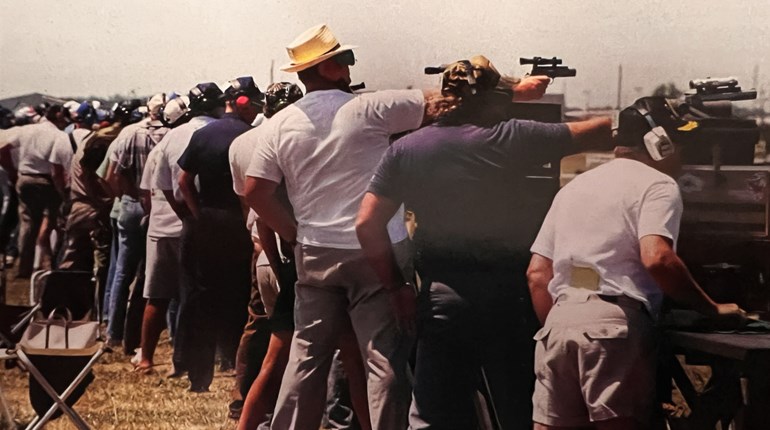
The suggestion of taking a firearms training course typically rouses emotions that will differ greatly from person to person. Some gun owners will take it as a blow to the ego, as if someone has implied that they don’t know how to handle a firearm safely, or that they exhibit poor marksmanship skills. Other shooters take the advice as an extension of their own thought patterns, seeing it as an opportunity to sharpen their skills. The truth is that nobody is born knowing how to shoot, and those starting down the path even slightly off base will only cement undesirable mannerisms into bad habits. This in turn will breed more undesirable mannerisms, starting a vicious cycle that will become a lifelong shooting career of blaming the wind, ammunition and optics.
In general, gun owners fall into one of three groups.
GROUP NO. 1: They understand that they weren’t born knowing the fundamentals of marksmanship before taking their first shots.
GROUP NO. 2: Upon unsatisfactory results after taking their first shots, they realize this information and seek help.
GROUP NO. 3: Despite unsatisfactory results, they refuse to accept that there are avenues for improvement that involve personal development.
Sadly, most gun owners fall into the last group. Group No. 3 types are satisfied with rudimentary marksmanship, and as long as they’re safe, more power to them. They are about as good as they’ll ever be and have learned everything they could ever know. Now, if you fall into the first two groups, congratulations are in order, because you are part of a small demographic that possesses a mindset that’s conducive to marksmanship growth. Best of all, after only a few hours of professional training, you are already going to be able to outperform a large portion of the third group, regardless of how long they’ve been shooting for.

If you are reading this, then I’ll assume that you haven’t taken a course yet and you are likely pondering what that experience is going to be like. With more than a decade’s worth of experience (and tens of thousands of students taught), allow me to share the collective feedback from students on how their training experiences differed from expectations.
Let’s begin with the first group. With more than nine million new gun owners joining the ranks since 2020, new gun owner courses at Renaissance Firearms Instruction have been filling just about as fast as we can find time on a range to book one. Referring back to the most common inquiry that we receive before a first-timer’s registration, many newcomers are under the impression that they need to have previous experience under their belts to take these courses. This is a common fallacy, particularly for basic courses. It’s important to remember that with respect to training, we go in uneducated to come out educated. Doctors don’t go to medical school, people interested in medicine do, and doctors are the result. Those looking to take their first steps should not feel intimidated when attending a 101-style course, and they certainly shouldn’t try to disguise their lack of knowledge.
I start most basic two-hour courses by asking all the students who have been to the range less than five times to raise hands (many hands will go up), and then make sure everybody in the course is aware of the other attendees’ skill level. The point of this exercise is to get everybody on the same page, with the understanding they will all have the same questions. In short—if you are taking a beginner-level course, don’t expect to feel stupid, and don’t expect your instructor to assume that you have any background whatsoever in firearms. You’ll find that there aren’t any stupid questions, and you’ll be surprised how many other students are wondering the same thing that you are.
The second group is comprised of my favorite students, as well as the ones that I attribute my hypertension to. By large, this group is made up of those that have realized that both themselves and their equipment can perform better and want to do something about it. These gun owners typically enroll in intermediate-level classes and that is almost always a perfect fit for them, especially if they are training with a new instructor or company. The biggest expectation here is that they are signing up for instruction that will rival the military’s most elite training courses—it won’t. I say this not to discredit civilian instructors or training companies, but to point out that military training is conducted with a team of highly skilled participants that know each other intimately. It pays to keep in mind that your relationship with the instructor is limited to just a few emails and phone calls, and at least for safety’s sake we need to operate in that realm.
I also encourage those with previous experience to arrive at these courses with an open mind, and be prepared to sit through a little bit of what you already know, since some people will need to catch up. Above all else, understand that it is not your class, and that you are a student, not an instructor or an instructor’s assistant. You paid for the instructor’s thoughts and lesson plan, let them finish the transaction by communicating what they know. At the end of the day, you are going to get the most out of the course by holding this attitude.
Of course, the best way for a course to meet your expectations is not to go in with any in the first place. Now, that’s not saying you should to walk into any course blind and hopeless, but rather the complete opposite. Before clicking “buy” you’ll get better results by doing a little digging first. Good companies will offer extensive details and perhaps even a peek at the syllabus of any given course.
Companies that really want participants to receive the right fit will post videos of actual course footage and maintain a direct pipeline to the folks that will be running the course. This is not only an opportunity to learn more about what will be taught, but about the people teaching it as well. Perhaps that instructor has a similar background and you instantly click, making you comfortable before setting foot on the range. Or, maybe you realize in just a few minutes that you can’t stomach the thought of spending a full day with that individual, and decide to take your business elsewhere. Information is the natural enemy of expectations, and sometimes all it takes is a few minutes of research to find out everything you might need to know about a particular training course. That way, you get exactly what you want from your hard-earned money, not to mention your valuable time.



































